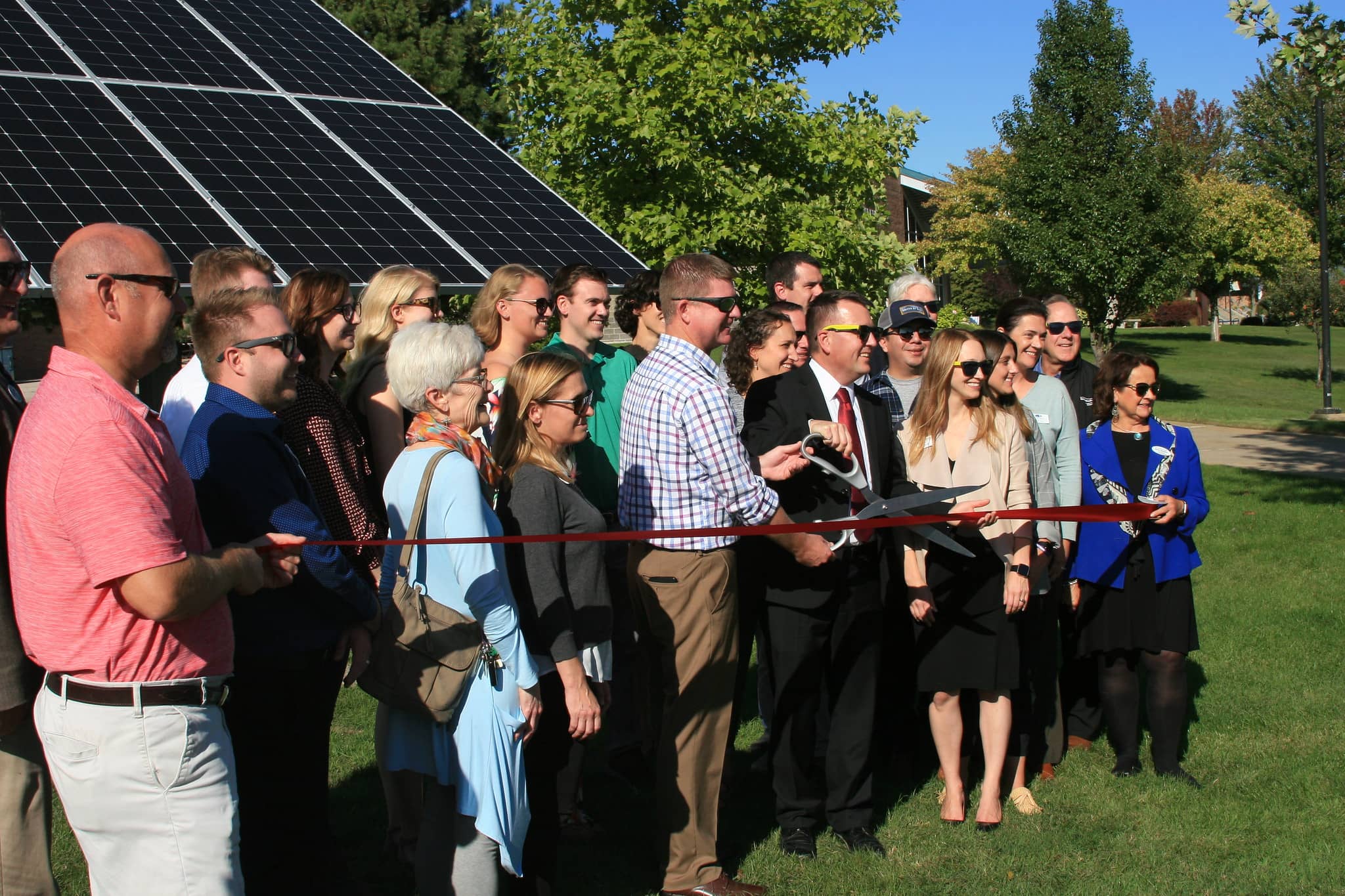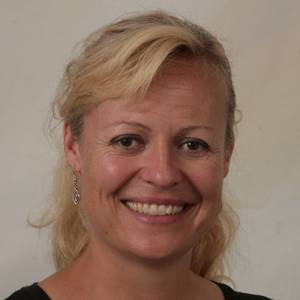Sustainability at North Central
Making our campus more sustainable

About North Central's Sustainability Committee
69���� has established a Campus Sustainability Committee to produce measurable progress in making our campus more sustainable. The committee guides changes that reduce the college’s environmental impact, encourage fiscal responsibility, and educate students and the community about best practices for a sustainable future. Contact committee members via email at sustainability@ncmich.edu.
Sustainability Initiatives
A solar panel array (pictured above) was installed on North Central's campus in 2019 following the successful completion of Solarize Petoskey, the class project for Leadership Little Traverse's Class of 2019.
Their goal was to create a learning opportunity that spanned the fields of sustainability, science and engineering, and they wanted the project to yield measurable results.
The plan? An 8 kW, 20-module, ground-mounted solar panel array that would produce approximately 11,000 kWh per year, to be fed back into the City of Petoskey’s electric grid.A mutual agreement with the college ensured that the solar panel array would find its home on campus, behind the Library.
Thanks to generous donors, LLT raised $40,000 to fund the project.In addition, Dave Kring Chevrolet Cadillac donated an electric vehicle-charging station, installed adjacent to the solar panel array and free for visitors to campus to use.A ribbon-cutting celebration in September 2019 marked the completion of LLT’s yearlong project.
In March 2020, a tracker was added to the solar panel array to measure its output.
North Central has made a commitment to hosting “zero waste” events in 2018. For both the Garden Party on August 12 and the annual Cookout on September 9, the college used all compostable and recyclable products. Many thanks to the support of the Emmet County Recycling for their support.
With the support of , College Food Services is now sending our kitchen waste from the College food service to be composted. The College is working hard to cut back on our waste that gets picked up and taken to the landfill. We also use between 91-94% of compostable products in food services with take-out containers, flatware, napkins, cups and more!
North Central has installed a small-scale waste-water treatment unit in the residence hall on the Petoskey campus. Working in partnership with SludgeHammer Group, Ltd., and the Little Traverse Bay Protection & Restoration Fund of the Petoskey-Harbor Springs Area Community Foundation, this demonstration unit, which uses biological technology to treat wastewater onsite, will reduce North Central’s impact on Petoskey’s municipal wastewater treatment facility by “pre-cleaning” the sewage discharged from campus. In fact, it’s believed that tests will demonstrate that the discharge water from the demonstration unit may ultimately be used for numerous non-potable applications at the college.
In addition, three North Central professors, Dr. Davina Gutierrez, Ben Crockett and Dr. Jeff Lockridge will create water resource awareness and stewardship modules in at least three college science courses, and a portable educational tool for use in K-12 schools.
"This collaboration at North Central will allow our students to see first-hand how locally-developed science and technology can make our Great Lakes region a leader in water quality, sustainability and innovation. It also demonstrates the commitment our College has made to building an environmentally responsible campus that will inspire our area's citizens and protect our unique ecological heritage," states Ben Crockett, professor of Human Biology.
“The SludgeHammer wastewater treatment unit has the potential to be a game-changer in the industry,” states Dr. David Roland Finley, president of North Central. “The implementation of this demonstration project at North Central provides tremendous opportunity for students and is a great example of community partnerships in bringing this installation to reality. Students will benefit by seeing the very latest in cutting-edge technology in this field, and curricula can be developed related to this project that will provide access to in-demand jobs for the 21st ����Գٳܰ���.”
Thanks to a grant from the Michigan Agency for Energy, North Central has converted all parking lot lighting to LED. The College replaced 52 incandescent lamps that used 400 watts of energy per hour with 52 new LED lamps that use only 120 watts per hour. This has produced a total reduction of energy usage of 14,560 watts per hour based on average electrical usage rate of .10 per KWH. The LED lights provide better outdoor lighting for parking lot safety, and the reduction in energy use from these bulbs generates a yearly savings of $4240 to the College’s operating costs. This figure is based on average usage of 8 hours a day.
Based on the success of this project, 69���� has adopted the sustainability practice to use LED lighting for all future bulb replacements. At present over 80% of all exterior lighting has been converted to LED. Eventually all lighting on campus will be LED.
With a grant from Coca-Cola / Keep America Beautiful and the efforts of North Central Student Hannah Jaskowski, Emmet County Recycling, and 69���� Physical Plant employees we added 15 new recycling bins throughout campus. These bins have divided openings for trash and recycling, which has helped to reduce the amount of landfill material produced by the College and increased the volume of recyclables sent to Emmet County Recycling. The new recycling bins also allow 69���� Physical Plant staff to more easily sort and return containers eligible for deposit. The money from the deposits on these recyclables contributes over $800 annually to the 69���� Foundation Scholarship Fund.
North Central is collaborating with Tip of the Mitt Watershed Council on the “North Central Michigan College Stormwater Wetland Restoration” project. As part of this project, the college installed landscaping plantings that improve infiltration and reduce stormwater runoff on campus.
A green roof has been installed over the north side of the Student and Community Resource Center, viewable from the east-facing windows within the Iron Horse Café. Funding for the project was secured through a grant from the Tip of the Mitt Watershed Council, in-kind gifts from Traverse City-based inhabitect LLC, and North Central Michigan College. A layer of permeable materials and plants collects and treats rainfall and snowmelt that would otherwise result in stormwater runoff. The green roof also provides a layer of insulation that reduces heating and cooling needs and associated costs.
A rain garden bioswale was installed adjacent to the college's jack and Dorothy Harris Health Education and Science Center. The bioswale, which was funded by a $15,000 grant from the Tip of the Mitt Watershed Council, receives runoff from nearby impervious surfaces and temporarily retains it, removing pollutants from the runoff before they are absorbed into the ground. the bioswale is not only beneficial for water runoff protection, it's also a model for college programs and community teaching.
North Central partnered with Michigan State University (MSU) to install an Enviroweather station on the far east end of campus, providing a learning resource for students and community members. The weather station maps and publishes data from weather stations across the state. Data collected by the weather station is available at the following link. .
Have an idea for a project?
North Central's Campus Sustainability Committee wants to hear it! Fill out our simple proposal form and let us help you make your idea a reality.
Interested in a career in sustainability?
North Central offers an Associate of Arts degree in Environmental and Sustainability Studies. Find more information in our catalog.

For information about North Central's Environmental and Sustainability Studies program:
Kerri Finlayson, M.A.
Environmental and Sustainability Studies
kfinlayson@ncmich.edu
231-348-6653
Get involved with our partners:
Sustainability tips and resources:
Recycle or Donate
Consider recycling items you no longer use (if they are recyclable), or donate them to a local resale shop.Reuse
Buy a reusable water bottle and fill it up at one of our many filtered fill stations around campus.
Repurpose
Instead of throwing out those leftovers, repurpose them into another dish for an easy lunch or dinner option the following day.For a comprehensive list of ideas, check out Global Stewards Sustainable Living Tips at .